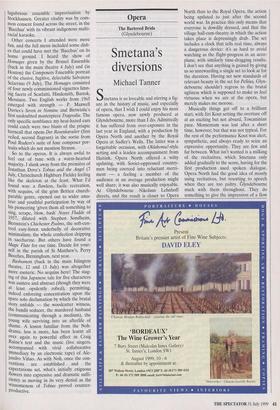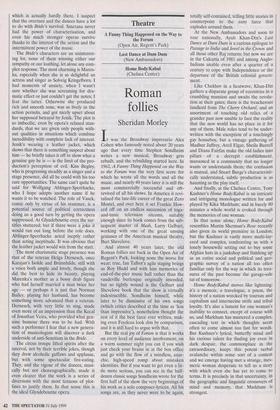Opera
Smetana's diversions
Michael Tanner
Smetana is so loveable and stirring a fig- ure in the history of music, and especially of opera, that I wish I could enjoy his most famous opera, now newly produced at Glyndebourne, more than I do. Admittedly it has suffered from over-exposure in the last year in England, with a production by Opera North and another by the Royal Opera at Sadler's Wells. The latter was a forgettable occasion, with Oklahomal-style setting and a leaden accompaniment from Haitink. Opera North offered a witty updating, with Soviet-oppressed country- men being coerced into reluctant merri- ment — a feeling a member of the audience at an average production might well share; it was also musically enjoyable. At Glyndebourne Nikolaus Lehnhoff directs, and the result is closer to Opera North than to the Royal Opera, the action being updated to just after the second world war. In practice this only means that everyone is dowdily dressed, and that the village hall-cum-theatre in which the action takes place is depressingly drab. The set includes a clock that tells real time, always a dangerous device: it's as hard to avoid watching as the flight-progress in an aero- plane, with similarly time-dragging results. I don't see that anything is gained by giving us so unrewarding a single set to look at for the duration. Having set new standards of relevant beauty in the set for Pelleas, Glyn- debourne shouldn't regress to the brutal ugliness which is supposed to make us feel virtuous when we are at the opera, but merely makes me morose.
Musically things got off to a brilliant start, with Jiri Kout setting the overture off at an exciting but not absurd, Toscaninian pace. Momentum was lost after a short time, however; but that was not typical. For the rest of the performance Kout was alert, sympathetic, and always ready to seize an expressive opportunity. They are few and far between. What isn't wanted is a milking of the recitatives, which Smetana only added gradually to the score, having for the first production used spoken dialogue. Opera North had the good idea of mostly using recitatives, but resorting to speech when they are too paltry. Olyndeboume stuck with them throughout. They do something to give the impression of a flow which is actually hardly there. I suspect that the overture and the dances have a lot to do with Bride's survival. Smetana never had the power of characterisation, and even his much stronger operas survive thanks to the interest of the action and the intermittent power of the music.
The Bride's characters are an uninterest- ing lot, none of them winning either our sympathy or our loathing, let alone any com- plex response. The most charming is Maren- ka, especially when she is as delightful an actress and singer as Solveig Kringelborn. I had moments of anxiety, when I wasn't sure whether she was screaming for dra- matic effect or just couldn't get the notes; I fear the latter. Otherwise she produced rich and smooth tone, was as lively as the action permits, and got nicely upset about her supposed betrayal by Jenik. The plot is so imbecilic, even by opera's relaxed stan- dards, that we are given only people with- out qualities in situations which combine incredibility with complete lack of interest. Jenik's wearing a leather jacket, which shows that there is something suspect about him — he briefly takes it off to show what a genuine guy he is — is the limit of the pro- duction's perception of evil. Kim Begley, who is progressing steadily as a singer and a stage presence, did all he could with his too rare opportunities. The same can't quite be said for Wolfgang Ablinger-Sperrhacke, who I hope adopts another name if he wants it to be watched. The role of Vasek, comic only by virtue of his stammer, is a potential source of political correctness doing us a good turn by getting the opera suppressed. At Glyndebourne even the sur- titles stuttered; but if there were a joke it would run out long before the role does. Ablinger-Sperrhacke acted ineptly rather than acting ineptitude. It was obvious that the leather jacket would win from the start.
The most charismatic stage presence was that of the veteran Helga Dernesch, once Karajan's Isolde and Brunnhilde, still with a voice both ample and lovely, though she did the best to hide its beauty, playing Marenka's mother as a bossy drab figure who had herself married a man twice her age — or perhaps it is just that Norman Bailey, playing her husband, has become something more advanced than a veteran. Dernesch, with very little to sing, made even more of an impression than the Kecal of Jonathan Veira, who provided what gen- uine humour there was to be had. With such a performer I fear that a new genera: tion of musicologists will discover a dark underside of anti-Semitism in the Bride.
The circus troupe lifted spirits after the interval, not by their terrible jokes, though they drew alcoholic guffaws and applause, but with some spectacular fire-eating. They, and the vigour of the dances, musi- cally but not choreographically, made it even clearer that the work is a series of diversions with the most tenuous of plot- lines to justify them. In that sense this is the ideal Glyndebourne opera.



























































 Previous page
Previous page